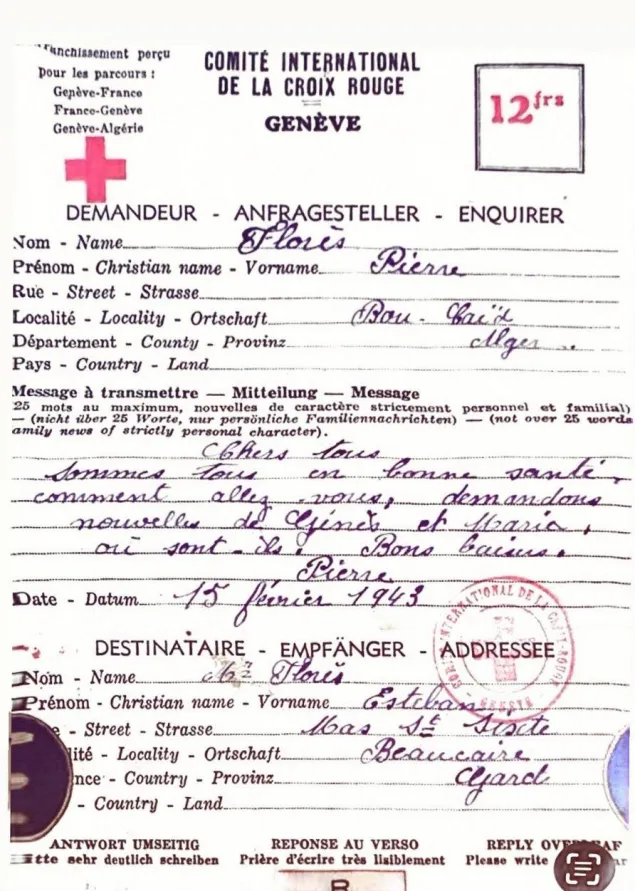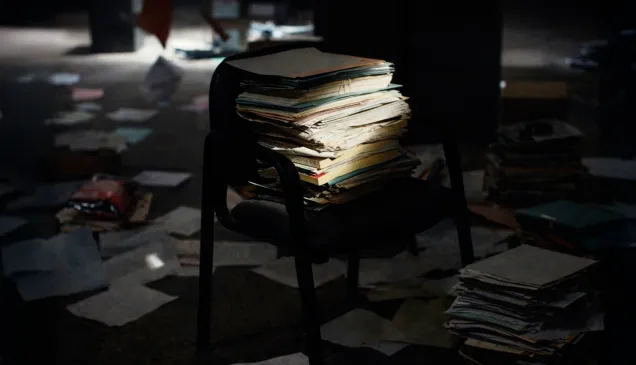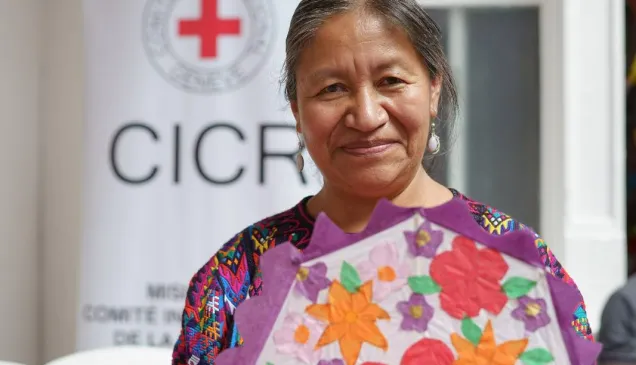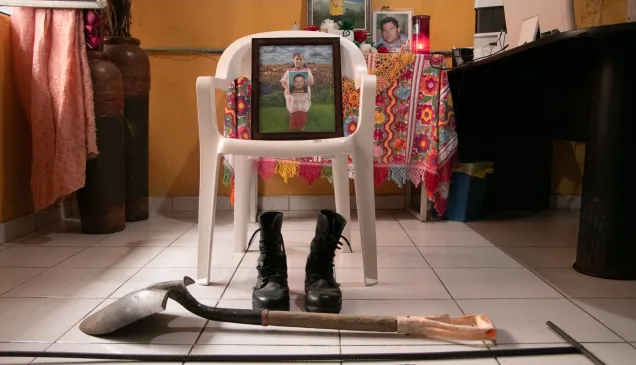War tore my family apart: One message brought us back together.
By Jérémy Renaux, coordinator for the Protection of Family Links in Mexico and Central America for the International Committee of the Red Cross (ICRC).
It wasn't until a few weeks ago, when my great-aunt shared a fragile, worn sheet of paper with faded blue ink, that I learned about my family’s desperation to stay in touch during World War II. The document was a brief Red Cross message, dated February 15, 1943, sent by my great-great-grandfather, Pierre Flores, from Algeria across the front lines to France to try to reach his children. It was his only—and last—hope to learn they were safe or even alive
After leaving Spain decades before the war, Pierre and his wife, Isabelle, emigrated to Algeria, where they put down roots. Shortly before the War-ravaged Europe prompting a mass exodus from the continent, their children—including my great-grandmother Maria—emigrated to France. Later, when the Nazis occupied the Ardennes—where part of my family lived in modern-day northern France near the Belgium border—Algeria and France became wartime enemies, making contact between family members impossible: there were no letters, no telegrams, no news.
The only exception was the Red Cross Message: a brief communication, barely 25 words long, that the International Committee of the Red Cross used, acting as a neutral intermediary, to relay news and maintain family contacts between warring countries. Pierre wrote to his son Esteban in the message:
"Dear all, we are in good health. How are you? We want to hear from Gines and Maria. Where are they? Kisses. Pierre.”
The message worked. Esteban received it and passed it on to María, who kept it. When she passed away in the 1980s, my great-aunt inherited all her papers. As a family, we know they were eventually reunited — but we don’t know how. Maybe it was through another Red Cross message, maybe they had to wait until the war ended the following year, or perhaps they found another way to reconnect. What matters is that they met again, in life.
When I came across the paper more than 80 years later, I was struck not just by its content—so short yet so full of life and hope—but by the improbable journey of this document. it's a testament to humanity during one of its darkest periods, and proof of one family's tenacious refusal to succumb to chaos.

As a twist of fate, I work today for the same humanitarian program that helped my great-great-grandfather in the last century: I coordinate efforts to keep families connected in Mexico and Central America, where thousands of people are still waiting for news of their loved ones who disappeared while migrating or due to armed violence or past conflicts.
Nowadays, despite having access to cell phones and new technologies, the essence is the same as it was in 1943: someone, somewhere, needs to know if their loved one is safe and sound.
Discovering this message not only completed a piece of my family's history, but also brought home the priceless value that each message and each search holds for families clinging to the hope of being reunited.
Today, more than 120 armed conflicts plague the world, but these are not the only scenarios in which people suffer. In many countries, armed violence has profound humanitarian consequences: communities are dissolved, people are killed, and families are separated as loved ones disappear. Right now, millions of people live in uncertainty, stripped of their most basic rights—including the right to family unity—and with the anguish of not knowing where their loved ones are and whether they are still alive.
In these contexts, this vital program from International Red Cross and Red Crescent Movement, the world's largest humanitarian network, remains for many the only way to maintain or reestablish contact with their relatives, becoming a powerful tool to protect family bonds among the most vulnerable people. Just as in 1943, a simple Red Cross Message allowed my great-great-grandfather to communicate with his children, we continue to provide this service at no cost to those who are waiting for news and have an urgent need to know the fate of their loved ones and to be reunited with their families.
Today, as we mark World Red Cross and Red Crescent Day, we honor the quiet, persistent work—a letter, a message or a call—that restores dignity and sustains hope for families determined to reconnect. It continues to represent hope in chaos and a living promise of our humanity; its legacy and action must be protected.
This article was originally published in El País on May 7, 2025.
https://elpais.com/america/2025-05-08/la-guerra-separo-a-mi-familia-un-mensaje-la-volvio-a-unir.html
About the ICRC
The ICRC, founded in 1863, is an independent, neutral, and impartial international humanitarian organization that provides protection and assistance to victims of armed conflict and other situations of violence. It is part of the International Red Cross and Red Crescent Movement—the world’s oldest and largest humanitarian network—and works hand in hand with its Red Cross and Red Crescent partners to expand its efforts.



